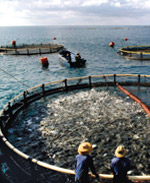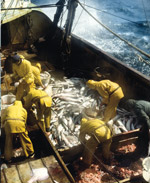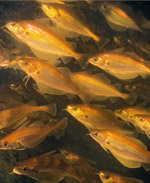- Exploiting a living resource: Fisheries
- > For decades, the catch from the world’s fisheries steadily increased – with the result that many fish stocks are now classified as overexploited or depleted. Failed fisheries policies and poor fisheries management are to blame for this situation. Short-term profits appear to take priority over the development of a low-impact, sustainable fisheries sector that will remain economically viable in the long term.

Is sustainable fishing feasible?
Fishing contributes significantly to our food supply and provides a source of income for millions of people. Most fish stocks worldwide, however, have been fished to the limits of their capacity or beyond. In the interest of sustainable fishing, it would be sensible to start by applying the classic instruments used to regulate catches far more consistently than hitherto, and to enforce them more effectively. It must be borne in mind, in this context, that a quota can only be effective if it is set at a sufficiently stringent level. The basic prerequisites for a sustainable and efficient fishing industry are effective national and international institutions to establish and monitor fisheries policy. One of the greatest challenges arising in the future will be to achieve a better understanding of the connections between human influence on the ecosystems and the development of natural resources, in order to establish a sustainable and economically viable marine fisheries sector. Furthermore, successful fisheries management must take account of the economic interactions between various fisheries. Maintaining natural resources is, ultimately, the key prerequisite for achieving long-term and sustainable revenues. Successful fisheries management will increase the profitability and productivity of the fishing industry. If stocks are given the chance to recover, this will also benefit the industry. Much higher yields could then be achieved in the long run, at greatly reduced fishing costs.



